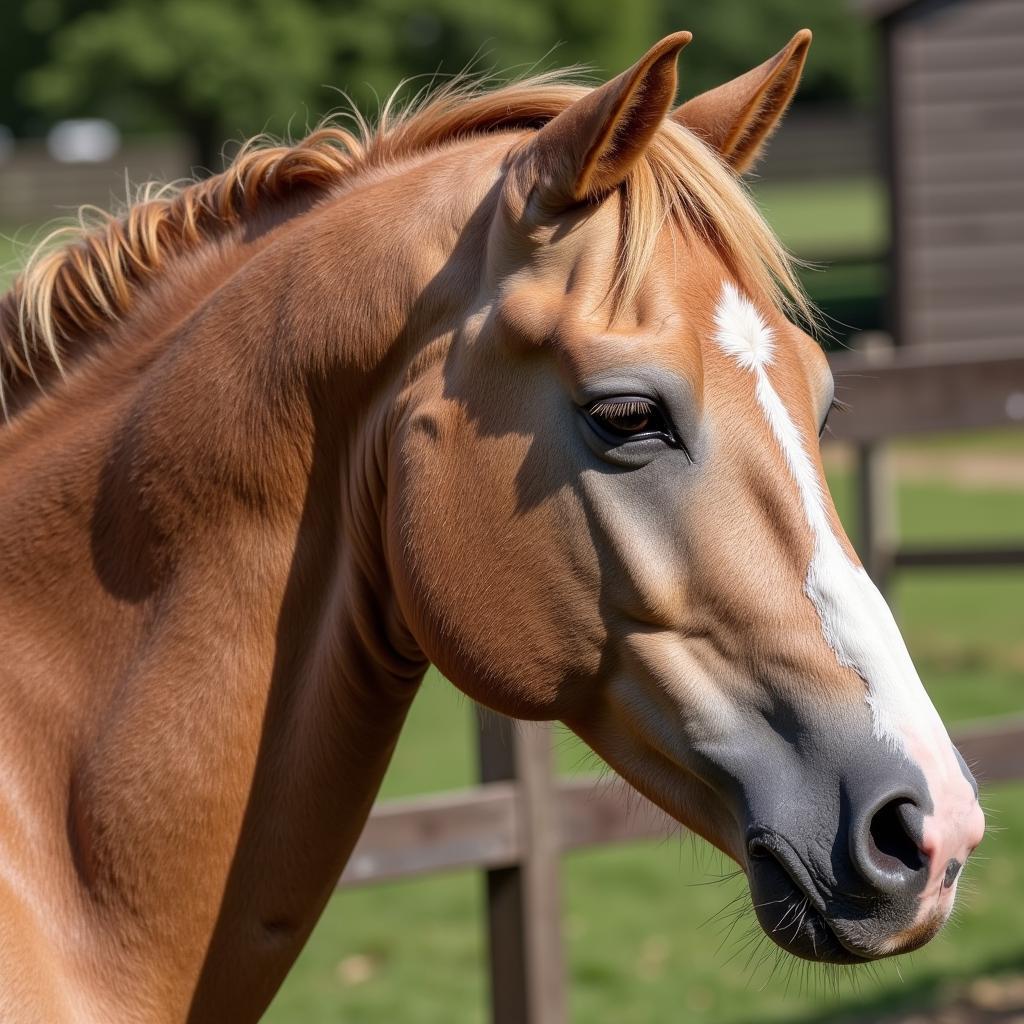Pigeon fever, also known as dryland distemper, is a bacterial infection that can cause abscesses in horses, particularly in the pectoral region (chest), hence the name “pigeon breast.” Understanding the Treatment For Pigeon Fever In Horses is crucial for any horse owner. This article provides a comprehensive guide to effectively managing this condition and ensuring your horse’s well-being.
Recognizing and Treating Pigeon Fever in Horses
Pigeon fever can manifest in various forms, from external abscesses to internal infections involving the liver, lungs, or abdomen. External abscesses are the most common, presenting as painful swellings, often on the chest, but they can also appear on the legs, abdomen, groin, or even the head. Internal infections are more serious and require immediate veterinary attention.
Recognizing the signs is the first step in effective treatment for pigeon fever in horses. Watch for fever, lethargy, lameness (if the abscess affects a limb), and of course, the characteristic swelling. If you suspect your horse has pigeon fever, contact your veterinarian immediately. Early diagnosis and intervention are key to a successful recovery.
What is the Best Treatment for Pigeon Fever?
The best treatment for pigeon fever depends on the type and severity of the infection. For external abscesses, treatment typically involves hot compresses, poulticing, and allowing the abscess to mature and drain naturally. how do horses get pigeon fever Your veterinarian may also prescribe antibiotics to combat the bacterial infection and pain relievers to manage discomfort. Surgical intervention is rarely necessary for external abscesses, but it might be required if the abscess is very large or located in a sensitive area.
Internal infections, on the other hand, require more aggressive treatment, often involving intravenous antibiotics and supportive care. Early detection and prompt veterinary care are paramount in managing internal pigeon fever.
Dr. Amelia Hernandez, DVM, an equine specialist based in Kentucky, emphasizes, “Early intervention is key in treating pigeon fever. The sooner you contact your vet, the better the prognosis for your horse.”
How Long Does it Take a Horse to Recover from Pigeon Fever?
Recovery time from pigeon fever varies depending on the severity of the infection. External abscesses typically take several weeks to heal completely, while internal infections can require several months of treatment and recovery.  Horse Recovering from Pigeon Fever Consistent care, proper hygiene, and adherence to your veterinarian’s instructions are crucial for a successful recovery.
Horse Recovering from Pigeon Fever Consistent care, proper hygiene, and adherence to your veterinarian’s instructions are crucial for a successful recovery.
Preventing Pigeon Fever in Horses
Good hygiene and management practices can significantly reduce the risk of pigeon fever. Regularly cleaning stalls, removing manure, and minimizing contact with contaminated soil or water are essential preventive measures. Fly control is also crucial, as flies can transmit the bacteria. Vaccination is available and recommended, especially in areas where pigeon fever is prevalent.
“Maintaining a clean environment for your horse is the best way to prevent pigeon fever,” advises Dr. James Riley, an equine veterinarian with over 20 years of experience. “Regular cleaning and fly control are paramount.”
What are the Stages of Pigeon Fever in Horses?
Pigeon fever progresses through several stages. Initially, the horse might exhibit fever and lethargy. Then, the characteristic abscesses develop. As the abscess matures, it softens and eventually ruptures, draining pus. Finally, the wound heals, leaving a scar. Understanding these stages helps in determining the appropriate treatment approach.
Conclusion: Ensuring Your Horse’s Well-being through Effective Pigeon Fever Treatment
Treatment for pigeon fever in horses requires vigilance, prompt action, and consistent care. By recognizing the symptoms, understanding the treatment options, and implementing preventive measures, you can effectively manage this challenging condition and ensure your horse’s well-being. Early veterinary intervention is crucial for successful recovery.
FAQ
- What are the first signs of pigeon fever in horses? Fever, lethargy, and localized swelling are the initial signs.
- Is pigeon fever contagious to other horses? While the bacteria can be present in the environment, direct horse-to-horse transmission is less common.
- Can pigeon fever be fatal? While rare, internal infections can be life-threatening if not treated promptly.
- How can I prevent pigeon fever in my horse? Good hygiene practices, fly control, and vaccination are key preventive measures.
- How long does the treatment for pigeon fever take? Recovery time varies depending on the severity of the infection, ranging from weeks to months.
- Can I treat pigeon fever myself? Always consult with a veterinarian for diagnosis and treatment. Self-treatment can be risky and ineffective.
- What should I do if I suspect my horse has pigeon fever? Contact your veterinarian immediately for diagnosis and treatment recommendations.
Do you have any other questions regarding horse care? Visit our website for more resources and articles: how do horses get pigeon fever
For immediate assistance regarding pigeon fever treatment or any other equine health concerns, please contact us: Phone: 0772127271, Email: [email protected] or visit our location at QGM2+WX2, Vị Trung, Vị Thuỷ, Hậu Giang, Việt Nam. Our customer service team is available 24/7.